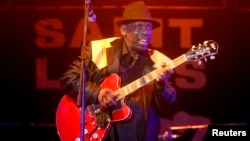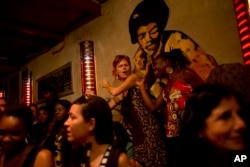SAINT-LOUIS, SENEGAL —
Once a lively French colonial trading port, the sleepy city of Saint-Louis in West Africa's Senegal bursts into life for just a few days a year during the annual summer jazz festival.
From dusk, jazz from the open-air concert blends with African rhythms, and drifts off the shores of the tiny island where the festival is held down the normally tranquil banks of the Senegal River.
This year's headline act, African-American blues singer Lucky Peterson, would have been hard pressed to find a venue more evocative of the suffering of slaves transported to the Americas, widely thought to have inspired the blues more than 100 years ago, than Saint-Louis.
The pastel-colored, rectangular shops and houses lining the river were once the warehouses for gum and ivory, as well as slaves, bound for the Atlantic trade.
But Peterson, a former child star who said he plays blues “with a touch of jazz, a touch of soul, a touch of funk and a touch of gospel," was anything but melancholic on the closing night of the festival June 8.
Closing night concert
Initially hidden behind dark shades, Peterson opened on the keys with a more than 10-minute cover of Johnny Nash's “I Can See Clearly Now,” occasionally needling the few audience members still sitting stiff in their chairs.
He then reached for a cherry-red electric guitar for an adrenaline-filled two-hour set peppered with numbers from his new album "The Son of a Bluesman," prompting a heartfelt encore.
“Lucky was like a man possessed. The energy was streaming out of his pores,” said Ibrahima Diop, the festival president.
Organizers had been seeking to boost the participation of local artists, partly to break down the local perception that jazz and blues music, despite humble origins, is elitist.
Senegalese jazz guitarist Herve Samb was invited back to Saint-Louis after last playing at the festival alongside Peterson in 1993 when he was just 14 years old.
“The goal was to bring back together two exceptional guitarists 20 years afterwards. This year's edition is all about the comeback,” said Mame Birame Seck, who selects the artists.
Twisting his hips in serpentine motions, Samb performed long, emotional call-and-response sessions with his saxophonist and drummer.
Among the instruments in his band was the sabar - a traditional west African drum set originally used to communicate between villages many kilometers apart.
“He played his butt off,” said Peterson, summing up Samb's performance afterwards.
Inspirational
For Samb, jazz, which began as a fusion between African and European rhythms, can still be inspired by African music.
“Many fusion projects are driven by musicians outside of African culture who don't know our music in depth. It needs to be reversed so it's driven by us,” he told Reuters.
The “comeback” theme also applies to the event itself. Having just celebrated its 22nd year, Africa's biggest jazz festival has in the past seen greats like Herbie Hancock, but audience numbers have dipped in recent years amid budget constraints.
While the budget this year was “just a sliver” of the 205 million CFA Franc ($424,800) that was sought, according to Diop, ticket sales rose in 2014 to around 5,000, and hotels were booked months in advance.
“We lost the confidence of a lot of our partners and now they are coming back,” Seck said
From dusk, jazz from the open-air concert blends with African rhythms, and drifts off the shores of the tiny island where the festival is held down the normally tranquil banks of the Senegal River.
This year's headline act, African-American blues singer Lucky Peterson, would have been hard pressed to find a venue more evocative of the suffering of slaves transported to the Americas, widely thought to have inspired the blues more than 100 years ago, than Saint-Louis.
The pastel-colored, rectangular shops and houses lining the river were once the warehouses for gum and ivory, as well as slaves, bound for the Atlantic trade.
But Peterson, a former child star who said he plays blues “with a touch of jazz, a touch of soul, a touch of funk and a touch of gospel," was anything but melancholic on the closing night of the festival June 8.
Closing night concert
Initially hidden behind dark shades, Peterson opened on the keys with a more than 10-minute cover of Johnny Nash's “I Can See Clearly Now,” occasionally needling the few audience members still sitting stiff in their chairs.
He then reached for a cherry-red electric guitar for an adrenaline-filled two-hour set peppered with numbers from his new album "The Son of a Bluesman," prompting a heartfelt encore.
“Lucky was like a man possessed. The energy was streaming out of his pores,” said Ibrahima Diop, the festival president.
Organizers had been seeking to boost the participation of local artists, partly to break down the local perception that jazz and blues music, despite humble origins, is elitist.
Senegalese jazz guitarist Herve Samb was invited back to Saint-Louis after last playing at the festival alongside Peterson in 1993 when he was just 14 years old.
“The goal was to bring back together two exceptional guitarists 20 years afterwards. This year's edition is all about the comeback,” said Mame Birame Seck, who selects the artists.
Twisting his hips in serpentine motions, Samb performed long, emotional call-and-response sessions with his saxophonist and drummer.
Among the instruments in his band was the sabar - a traditional west African drum set originally used to communicate between villages many kilometers apart.
“He played his butt off,” said Peterson, summing up Samb's performance afterwards.
Inspirational
For Samb, jazz, which began as a fusion between African and European rhythms, can still be inspired by African music.
“Many fusion projects are driven by musicians outside of African culture who don't know our music in depth. It needs to be reversed so it's driven by us,” he told Reuters.
The “comeback” theme also applies to the event itself. Having just celebrated its 22nd year, Africa's biggest jazz festival has in the past seen greats like Herbie Hancock, but audience numbers have dipped in recent years amid budget constraints.
While the budget this year was “just a sliver” of the 205 million CFA Franc ($424,800) that was sought, according to Diop, ticket sales rose in 2014 to around 5,000, and hotels were booked months in advance.
“We lost the confidence of a lot of our partners and now they are coming back,” Seck said














